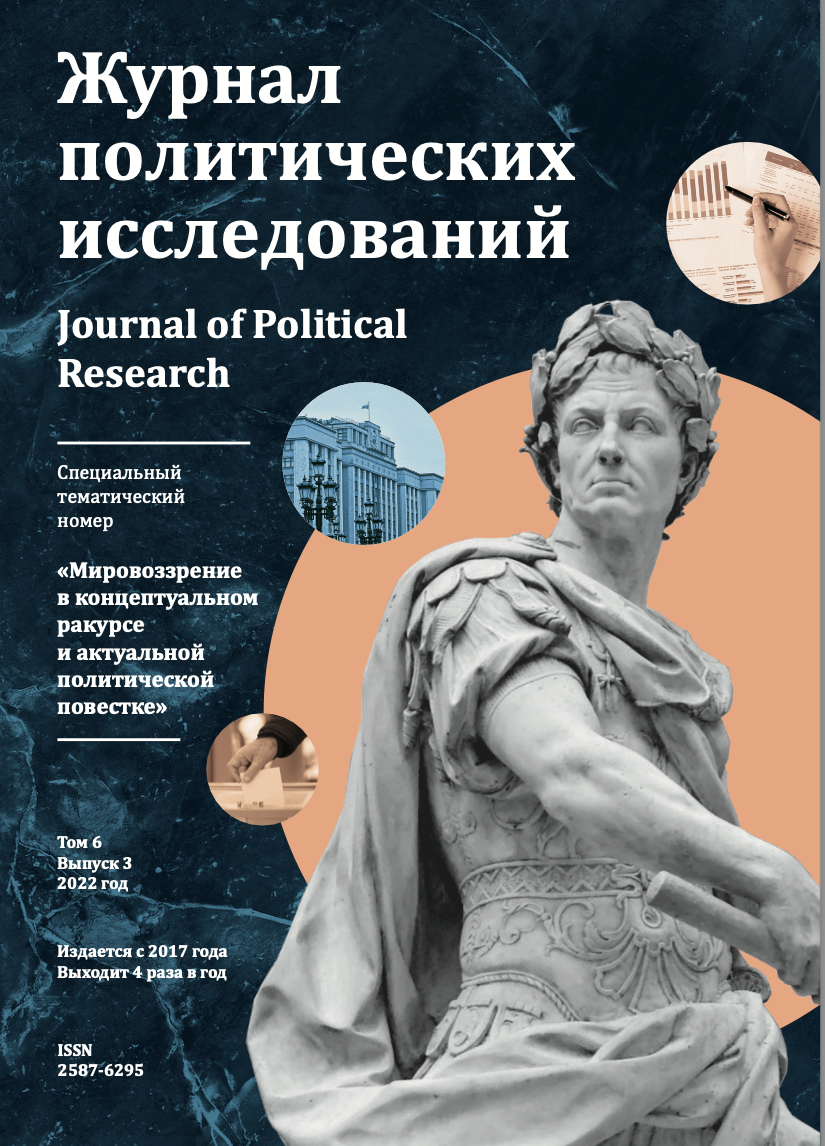from 01.01.2022 until now
Saint Petersburg, St. Petersburg, Russian Federation
UDC 351/354
The purpose of the study is to analyze the nature of the interaction of political networks between the authorities of St. Petersburg and representatives of large businesses during the implementation of projects in the field of ESG. The author chose the method of network analysis based on graph theory, in which a network model is formed - a graphical representation of a network consisting of nodes and connections between them. It is concluded that large St. Petersburg companies followed the trend of ESG transformation, while not only engaged in social investment, but also actively contact the authorities in solving these tasks. However, the number of links in the implementation of ESG projects over the period 2019-2021 has not changed significantly in the direction of increase or decrease, which indicates a stagnation in the pace of the transformation under consideration. The theoretical significance of the study lies in deepening the tools for researching the policies of economic and political actors in the field of ESG. The practical significance of the research lies in expanding the scope of network analysis in political research, including with the help of the Pajek program.
public administration, network analysis, ESG, green economy, network model, St. Petersburg
1. Arkhiv otkrytogo dostupa Sankt-Peterburgskogo gosudarstvennogo universiteta [Open access archive of St. Petersburg State University] Available at: https://dspace.spbu.ru/handle/11701/39779?locale=ru (Accessed: 05.03.2024).(In Russian).
2. Zamyatina M.F. Problemy i perspektivy ustoychivogo razvitiya rossiyskikh regionov v kontekste geopoliticheskoy turbulentnosti. [Problems and prospects for sustainable development of Russian regions in the context of geopolitical turbulence]. Ekonomika Severo-Zapada: problemy i perspektivy razvitiya [Economy of the North-West: problems and development prospects]. 2023. I. 1 (72). pp. 27-39. (In Russian). DOI: https://doi.org/10.52897/2411-4588-2023-1-27-39; EDN: https://elibrary.ru/DEBDAW
3. Kim A.V. Kachestvennyy setevoy analiz v strategii smeshivaniya metodov v sotsial'nykh naukakh: sistematicheskiy obzor literatury. [Qualitative network analysis in mixed methods strategies in the social sciences: a systematic literature review]. Sotsiologiya: metodologiya, metody, matematicheskoe modelirovanie. [Sociology: methodology, methods, mathematical modeling]. 2021. I. 53. pp. 83-116. (In Russian). DOI: https://doi.org/10.19181/4m.2021.53.3; EDN: https://elibrary.ru/XJRIYF
4. V. Ya. Gorfinkel' [i dr.]; pod red. V. Ya. Gorfinkelya, N. V. Rodionovoy. Korporativnaya sotsial'naya otvetstvennost': uchebnik dlya vuzov. [Corporate social responsibility: a textbook for universities]. 3-e izd., pererab. i dop. M.: Izdatel'stvo Yurayt. 2021. 490 p. (In Russian).
5. Perov A.V., Simonov K.V. Uvlechenie ESG-tematikoy kak lakmusovaya bumaga rossiyskoy sistemy gosupravleniya // Vlast'. 2023. T. 31. № 1. S. 9-17. DOI: https://doi.org/10.31171/vlast.v31i1.9455; EDN: https://elibrary.ru/MGKGYL
6. Pomiguev I.A., Fomin I.V., Mal'tsev A.M. Setevoy podkhod v zakonodatel'nykh issledovaniyakh: perspektivnye metody kachestvennogo i kolichestvennogo analiza parlamentskoy deyatel'nosti [Network approach in legislative research: promising methods for qualitative and quantitative analysis of parliamentary activity]. Politicheskaya nauka [Political science]. 2021. I 4. pp. 31-59. (In Russian). DOI: https://doi.org/10.31249/poln/2021.04.02; EDN: https://elibrary.ru/UKBANA
7. Semenova D.M., Kudryavtsev S.A. ESG v politicheskom diskurse sovremennoy Rossii: klyuchevye riski. [ESG in the political discourse of modern Russia: key risks]. Vestnik Permskogo universiteta. Politologiya [Bulletin of Perm University. Political science]. 2023. V. 17. I 2. pp. 39-47. (In Russian). DOI: https://doi.org/10.17072/2218-1067-2023-2-39-47; EDN: https://elibrary.ru/GGTPXQ
8. Smorgunov L.V. Tsifrovizatsiya i setevaya effektivnost' gosudarstvennoy upravlyaemosti. [Digitalization and network efficiency of state governance]. Politicheskaya nauka [Political science]. 2021. I. 3. pp. 13-36. (In Russian). DOI: https://doi.org/10.31249/poln/2021.03.01; EDN: https://elibrary.ru/KHMUCH
9. Smorgunov L. V., Sherstobitov A. S. Politicheskie seti: Teoriya i metody analiza: Uchebnik dlya studentov vuzov [Political networks: Theory and methods of analysis: A textbook for university students]. M.: Izdatel'stvo «Aspekt Press». 2014. 320 p. (In Russian).
10. Tikhonov V.A., Stepanova N.R., Shalina D.S. ESG-transformatsiya bankov kak drayver razvitiya esg-praktik v usloviyakh sanktsionnogo davleniya. [ESG transformation of banks as a driver for the development of esg practices in the context of sanctions pressure]. Vestnik Altayskoy akademii ekonomiki i prava [Bulletin of the Altai Academy of Economics and Law]. 2022. I. 11-3. pp. 556-562. (In Russian). DOI: https://doi.org/10.17513/vaael.2603; EDN: https://elibrary.ru/EILPGO
11. Sherstobitov A.S., Osipov V.A., Zaripov N.A. Problemy i perspektivy setevogo podkhoda k analizu politiki: razvitie teorii i metodov ili tshchetnye poiski "zolotogo telenka"? [Problems and prospects of the network approach to policy analysis: development of theory and methods or a futile search for the “golden calf”?]. Politicheskaya nauka [Political science]. 2021. I 4. pp. 60-91. (In Russian). DOI: https://doi.org/10.31249/poln/2021.04.03; EDN: https://elibrary.ru/ISUUNK
12. Chen, Ted Hsuan Yun. Statistical inference for multilayer networks in political science, Political Science Research and Methods, 2021, V. 9.2, pp. 380-397.
13. Kim, S., & Yoon, A. Analyzing active fund managers’ commitment to ESG: Evidence from the United Nations Principles for Responsible Investment, Management science, 2023. V.69(2), pp. 741-758.
14. Liu, X., Yang, Y., Jiang, Y., Fu, Y., Zhong, R. Y., Li, M., & Huang, G. Q. Data-driven ESG assessment for blockchain services: A comparative study in textiles and apparel industry, Resources, Conservation and Recycling, 2023, V. 190, p. 106837. DOI: http://dx.doi.org/10.1016/j.resconrec.2022.106837.
15. Yang C, Hao W, Song D. The effect of political turnover on corporate ESG performance: Evidence from China, PLoS One, 2023, V. 18(7):e0288789. DOI: https://doi.org/10.1371/journal.pone.0288789. EDN: https://elibrary.ru/KLOZCW
16. Perov A.V., Simonov K.V. Uvlechenie ESG-tematikoy kak lakmusovaya bumaga rossiyskoy sistemy gosupravleniya. [Passion for ESG topics as a litmus test for the Russian public administration system]. Vlast' [Power]. 2023. V. 31. I. 1. pp. 9-17. (In Russian). DOI: https://doi.org/10.31171/vlast.v31i1.9455; EDN: https://elibrary.ru/MGKGYL




















